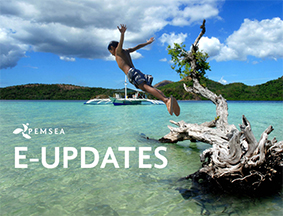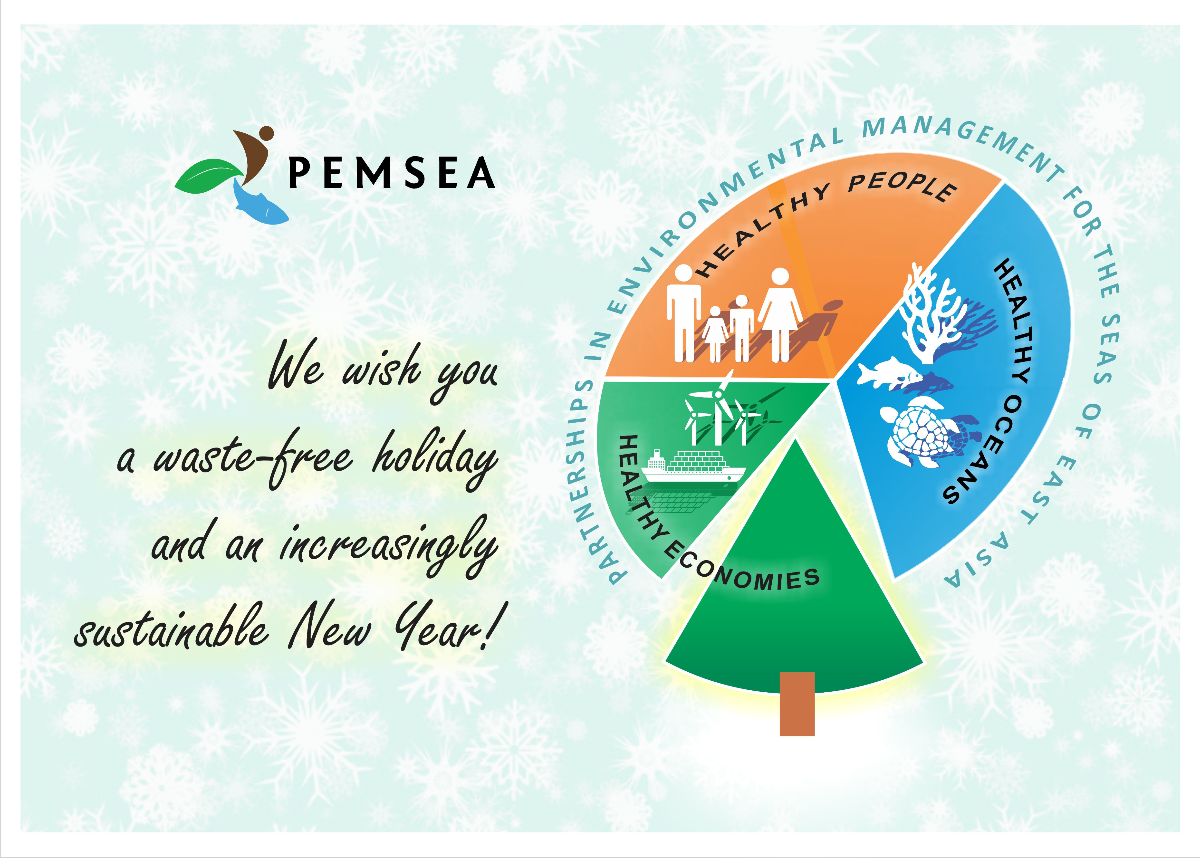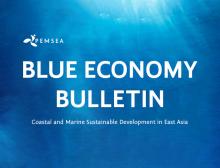
Breadcrumb
-
E-Update January 2020
Welcome to the first of PEMSEA's 2020 e-updates. We would like to open the year by sharing information about our SEA Knowledge Bank (SEAKB), which had its contents and features expanded in 2019. The High Level Panel for the Sustainable Ocean Economy has released the first two of its Blue Paper Reports, The future of food from the sea and The expected impacts of climate change on the ocean economy. The climate change paper is timely, given the past 10 years were the hottest in history.
The UN is drafting new plans to replace the expired and largely unachieved Aichi biodiversity targets, with the aim of halting further extinction. These targets will be too late for the Chinese paddlefish, which has been declared extinct by researchers. The target to reach a deal by 2020 to prevent overfishing has also been missed.
Global consumption is rising, reaching 100 billion tonnes annually last year. China has taken action to reduce its waste output, announcing bans on some single-use plastic items. Uncollected waste is thought to have exacerbated flooding in Jakarta over the New Year period.
In between newsletters, follow us on Facebook and Twitter (@PEMSEA) for the latest updates.
-
PEMSEA's 2019
Dear PEMSEA partners and friends,
2019 was an exciting year of expansion for PEMSEA. As we pause for the year end and recharge for the New Year, here are 10 moments that highlight how the work of PEMSEA expanded over the past year, through new thinking, to new places, to new sectors, and with new partners!
-
E-Update November 2019
Welcome to the November PEMSEA e-update. This month saw the initiation of Phase 2 of the Arafura and Timor Seas project, which will work to improve the sustainability of these two seas. PEMSEA has also seen continued cooperation with its long-term partners in Xiamen, with the Xiamen Municipal Government being awarded a leadership award for its work in the PNLG and for ICM, and with Xiamen University collaborating with PEMSEA to hold a 7-day study tour for sustainable coastal development for PNLG and PNLC members. In between newsletters, follow us on Facebook and Twitter (@PEMSEA) for the latest updates.
-
Blue Economy Bulletin October 2019
Welcome to the October edition of our Blue Economy Bulletin. In conjunction with this October's Our Ocean conference, PEMSEA released a new report highlighting our experience in the blue economy investment space. Informed by pilot studies, the report is based on a synthesis of primary and secondary research on the latest trends and practices related to ocean investment, and blue economy and private sector engagement in collaboration with organizations, funds, and investment experts. It also informed a published paper on mainstreaming private and public investment in the blue economy.
Such investments are becoming increasingly popular, with over $63 billion pledged to restore ocean health in the Our Ocean conference. Ocean health is key to sustaining natural capital, such as coral reefs and whales, which provide critical ecosystem services. Recovery and sustainability have been highly visible in the Philippines, where parts of the Pasig River system and the island of Guimaras have seen significant environmental restoration, and there is a national effort to ensure the sustainability of blue swimming crab harvests. Further progress has been made to deal with marine plastic pollution, with a new report on standardizing the measurement of waste leakage, and another report highlighting the impact a circular economy could have on climate change. Meanwhile, attendees from local governments throughout Southeast Asia met to discuss the plastic waste challenges facing them.
Follow the latest updates on blue economy and coastal sustainable development in East Asia on Facebook and Twitter (@PEMSEA). We welcome your feedback, and please let us know if there are other blue economy topics you would like to see in future newsletters and programs.
-
E-Update September 2019
Welcome to the September PEMSEA e-update. This month bring a moment for critical reflection on climate change and the oceans, following the recent publication of the IPCC's Special Report on the Ocean and Cryosphere in a Changing Climate (SROCC). Importantly, this report discusses not only the physical and ecosystem changes in the ocean itself, but the impact of these changes on vulnerable coastal communities. PEMSEA and its partner countries have long recognized the importance of climate change adaptation and mitigation, and this report reinforces the importance of work such as the coastal use zoning capacity development PEMSEA provides to local government partners. In between newsletters, follow us on Facebook and Twitter (@PEMSEA) for the latest updates.
-
Blue Economy Bulletin August 2019
Welcome to PEMSEA's August Blue Economy Bulletin. This month PEMSEA looks at two coastal jurisdictions which lie along the seas of East Asia and are facing the challenge of ensuring development and growth occurs in a sustainable manner. Preah Sihanouk in Cambodia uses integrated coastal management (ICM) to conserve its environment and develop alternative livelihoods. Indonesia's Surabaya undertook a variety of complementary measures on waste management to tackle a daunting waste overload.
Other examples of sustainable coastal development can be found throughout the seas of East Asia. Kitakyushu in Japan faced development challenges half a century ago, and is now considered an eco city. The Philippine island of Samal has turned clams from a food source to an ecotourism attraction. Ca Mau in Viet Nam has seen the growth of organic farms that alternate between shrimp and rice in a manner that needs few potentially harmful chemicals. Singapore is preparing for a future with higher sea levels, expecting to spend over SGD 100 billion over the next century.
Climate change and the resultant rise in sea levels will mean that adaptation and mitigation will be needed on coasts around the world. Another consideration for coastal planning is land tenure, which can have significant impacts on how a community changes as it switches between economic models. Away from the coasts, ongoing negotiations look to establish regulations for managing international waters and for mining on the ocean floor.
Follow the latest updates on blue economy and coastal sustainable development in East Asia on Facebook and Twitter (@PEMSEA). We welcome your feedback, and please let us know if there are other blue economy topics you would like to see in future newsletters and programs.
-
E-Update July 2019
Welcome to the July PEMSEA e-update. Towards the end of July PEMSEA held the 11th East Asian Seas (EAS) Partnership Council Meeting, confirming new leadership that will guide PEMSEA in moving towards a vision of healthy oceans, people, and economies. The meeting had partners share updates in implementing the Sustainable Development Strategy for the Seas of East Asia (SDS-SEA) which closely aligns with the UN SDGs and other international commitments. They also discussed how the region has been delivering on science based scalable solutions since 1993 and viewed the upcoming UN Decade of Ocean Science for Sustainable Development as an excellent opportunity to share and exchange knowledge, experiences and best practices in linking science-policy and local action within the region and beyond. In between newsletters, follow us on Facebook and Twitter (@PEMSEA) for the latest updates.
-
Blue Economy Bulletin June 2019
Welcome to PEMSEA's Blue Economy Bulletin. This month, we released our annual report for 2018, which was a milestone year representing 25 years of PEMSEA's work on Integrated Coastal Management in the Seas of East Asia. Elsevier published a PEMSEA paper which describes the evolution of PEMSEA from a regional marine pollution project to an international organization working on integrated management solutions and partnerships and examines future key areas of intervention by PEMSEA. We also welcome a new project manager to lead the SDS-SEA in the future.
Over 100 countries have now signed on to the Port State Measures Agreement (PSMA), which increases the ability of countries to police IUU fishing. Ensuring fishing is sustainable requires increased knowledge of ecological connectivity between national fisheries and the high seas, something that will be aided by the further mapping of the sea floor. A draft text on a new UNCLOS agreement on managing biodiversity in international waters has been released.
The potential of using investments to make a difference has become clear as over $500 billion have now been put into impact investments globally. The Chinese Government is looking to expand the country's aquaculture industry. The Philippine Government has asked financial institutions to invest more in lower carbon projects. Banks involved in the shipping industry have agreed to a set of guidelines designed aid the lowering of shipping emissions.
Follow the latest updates on blue economy and coastal sustainable development in East Asia on Facebook and Twitter (@PEMSEA). We welcome your feedback, and please let us know if there are other blue economy topics you would like to see in future newsletters and programs.
-
E-Update May 2019
Welcome to the May PEMSEA e-update. This month saw the release of a significant and comprehensive report on the state of global biodiversity from the Intergovernmental Science-Policy Platform on Biodiversity and Ecosystem Services (IPBES). It paints a troubling picture, highlighting the gaps in current action and the challenges we face. Biodiversity is heavily affected by all manner of human activity, and in turn has a strong impact on the lives of people around the world. This e-update is focused on stories relating to biodiversity, beginning with good news on a coral replanting project in a PEMSEA ICM site. In between newsletters, follow us on Facebook and Twitter (@PEMSEA) for the latest updates.


